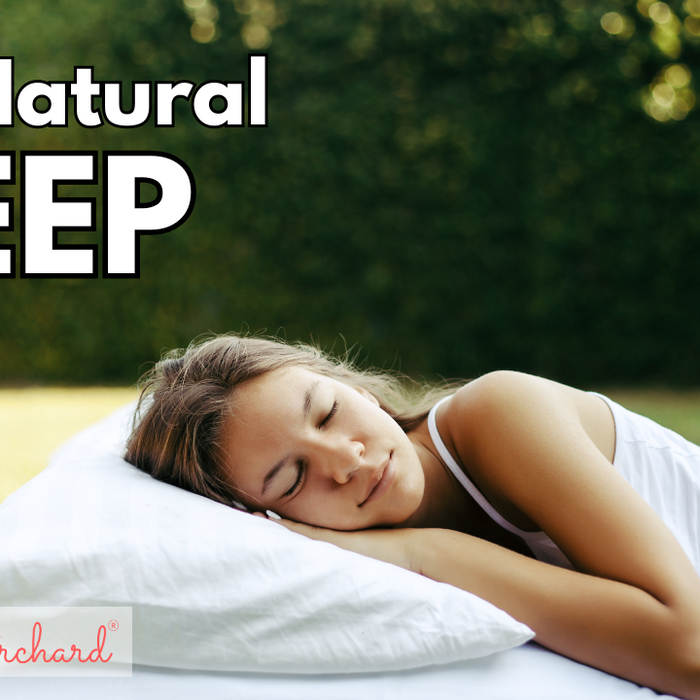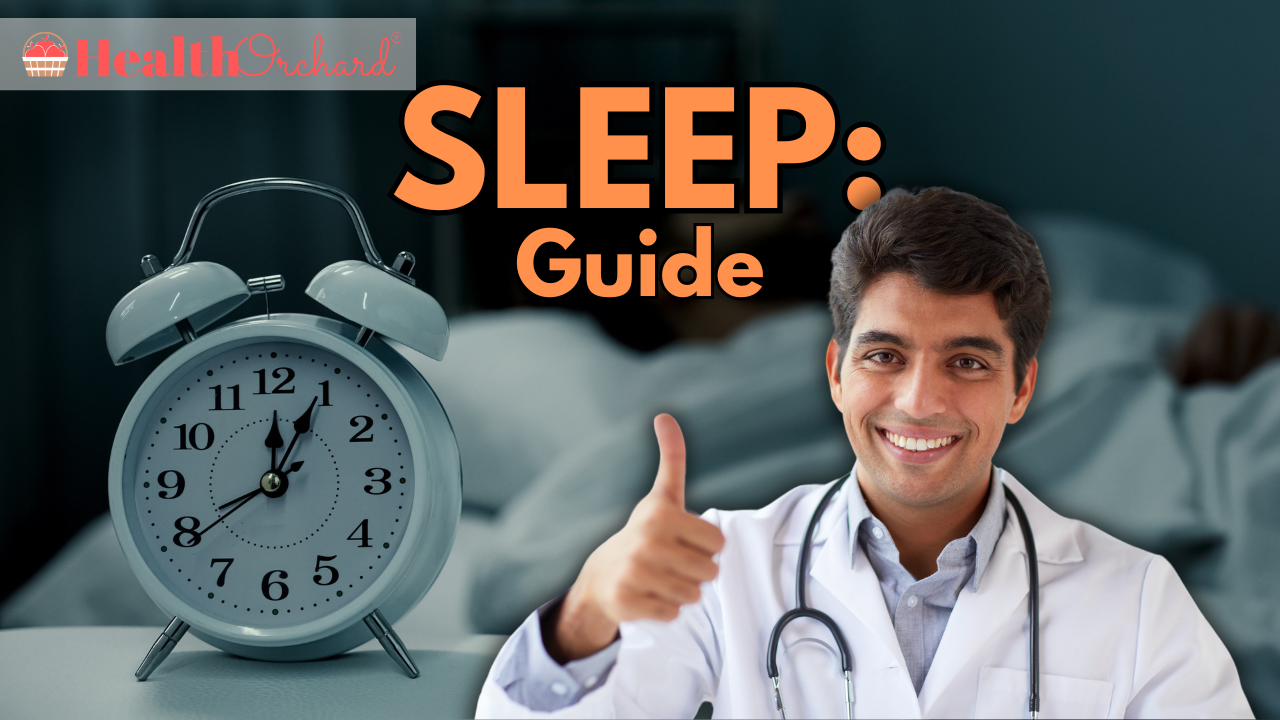

Sleep for Overall Health & Well-Being: Guide
Key Takeaways
- Quality sleep is essential for various bodily functions, including immune support, cognitive performance, and emotional regulation.
- Chronic lack of sleep can lead to severe health issues, including increased risk of cardiovascular disease, diabetes, and mental health disorders.
- Implementing evidence-based tips and strategies can significantly improve your sleep quality and overall health.
- Consistency in sleep habits, including maintaining a regular sleep schedule, is crucial for optimizing sleep quality.
- Your sleep environment plays a vital role in sleep quality - factors like room temperature, light exposure, and noise levels can significantly impact your rest.
- Nutrition and exercise have a strong connection to sleep quality, and making informed choices in these areas can lead to better sleep.
Sleep is a fundamental pillar of human health and well-being. This essential biological process allows our bodies to repair, regenerate, and prepare for the challenges of each new day. Despite its importance, many people struggle to get the quality sleep they need in our fast-paced, always-connected world.
This comprehensive guide will explore the science of sleep, its numerous health benefits, and practical strategies to improve your sleep quality. We'll provide an overview on common sleep disorders, factors affecting sleep, and how to create an optimal sleep environment. You'll learn about the interplay between sleep, nutrition, and exercise, as well as how to manage stress for better rest.
We'll also discuss natural remedies and supplements that can aid in sleep improvement, including those available from Health Orchard, a trusted source for vitamins and supplements in the US.
The Science of Sleep
To understand the importance of sleep, we must first explore its underlying mechanisms. Sleep is not a uniform state but a dynamic process consisting of multiple stages and cycles.
Sleep Cycles and Stages
Sleep is divided into two main types: Rapid Eye Movement (REM) sleep and Non-Rapid Eye Movement (NREM) sleep. A typical night's sleep consists of 4-6 cycles, each lasting about 90 minutes.
NREM sleep is further divided into three stages:
- N1 (light sleep): The transition between wakefulness and sleep.
- N2 (deeper sleep): Body temperature drops and heart rate slows.
- N3 (deep sleep): Also known as slow-wave sleep, critical for physical recovery and maintaining a good fitness routine.
REM sleep, characterized by rapid eye movements and vivid dreams, is essential for cognitive function and memory consolidation.
Circadian Rhythms
Our sleep-wake cycle is regulated by circadian rhythms, internal biological clocks that respond to environmental cues, primarily light. These rhythms influence various physiological processes, including hormone production, body temperature, and metabolism.
How Sleep Affects the Body and Brain
During sleep, the body undergoes important processes such as:
- Cellular repair and growth
- Hormone regulation, including growth hormone and cortisol
- Consolidation of memories and learning
- Clearance of metabolic waste from the brain
Health Benefits of Quality Sleep
Physical Health Benefits
- Immune System Support: Sleep enhances the production and function of immune cells, helping fight off infections and diseases.
- Cardiovascular Health: Adequate sleep helps regulate blood pressure and reduces the risk of heart disease and stroke.
- Weight Management: Proper sleep balances hunger hormones, reducing the likelihood of overeating and obesity.
Mental Health Benefits
- Cognitive Function and Memory: Sleep is needed for attention, problem-solving, and memory consolidation.
- Emotional Stability: Quality sleep helps regulate mood and emotional responses, reducing irritability and mood swings.
- Stress Reduction: Sleep allows the body to reset stress hormones, promoting better stress management during waking hours.
Consequences of Poor Sleep
Short-Term Effects of Poor Sleep
- Impaired Concentration and Performance: Even one night of poor sleep can significantly reduce cognitive function and reaction times.
- Mood Swings and Irritability: Lack of sleep can lead to emotional volatility and decreased ability to cope with stress.
Long-term Effects of Poor Sleep
- Increased Risk of Chronic Diseases: Chronic sleep deprivation is associated with higher risks of diabetes, obesity, and cardiovascular disease.
- Mental Health Disorders: Persistent sleep issues can contribute to the development or exacerbation of anxiety, depression, and other mental health conditions.
Common Sleep Disorders
Insomnia
Insomnia is the difficulty in falling or staying asleep. It can be short-term or chronic, often caused by stress, anxiety, or poor sleep habits. Practicing good sleep hygiene, such as maintaining a regular sleep schedule, avoiding caffeine and electronic devices before bed, and creating a relaxing bedtime routine, can help manage insomnia.
Sleep apnea
Sleep apnea is a serious disorder where breathing repeatedly stops and starts during sleep. It can lead to fragmented sleep and other health complications. If you suspect you have sleep apnea, consult a healthcare provider. Treatment options include lifestyle changes, CPAP machines, and sometimes surgery.
Restless leg syndrome
Restless leg syndrome causes an uncontrollable urge to move the legs, usually accompanied by uncomfortable sensations, disrupting sleep. Regular exercise, avoiding caffeine, and practicing leg stretches before bed can help manage symptoms.
Narcolepsy
Narcolepsy is characterized by excessive daytime sleepiness and sudden sleep attacks. It is a neurological disorder affecting the control of sleep and wakefulness. Manage narcolepsy with scheduled naps, medication, and lifestyle adjustments. Consult a sleep specialist for personalized treatment.
Symptoms and diagnosis
Common symptoms of sleep disorders include excessive daytime sleepiness, loud snoring, and difficulty staying asleep. Diagnosis typically involves a sleep study or consultation with a sleep specialist.
Treatment options for sleep disorders
- Medical interventions (e.g., CPAP for sleep apnea)
- Behavioral therapies (e.g., cognitive behavioral therapy for insomnia)
- Self-help strategies (e.g., sleep hygiene improvements)
Factors Affecting Sleep Quality
Here are some of the top factors to be aware of when it comes to sleep quality.
Environmental Factors That Affect Sleep Quality
- Light: Exposure to artificial light, especially blue light from screens, can disrupt circadian rhythms.
- Noise: Ambient noise can disturb sleep, even if it doesn't fully wake you.
- Temperature: The ideal sleep temperature is generally between 60-67°F (15-19°C).
Lifestyle Factors That Affect Sleep Quality
- Diet and Nutrition: Heavy meals close to bedtime can disrupt sleep. Certain nutrients and healthy eating can promote better sleep.
- Exercise and Physical Activity: Regular exercise can improve sleep quality, but timing is important.
- Alcohol and Caffeine Consumption: Both can significantly impact sleep quality and duration.
- Stress and Anxiety: Mental tension can make it difficult to fall asleep and stay asleep.
- Technology Use and Blue Light Exposure: The use of electronic devices (such as mobile phones, tablets, handheld games, e-readers etc) before bed can interfere with the body's natural sleep-wake cycle.
Creating the Ideal Sleep Environment
A great sleep environment can make all the difference. Here are the essential things you need for a great sleep environment.
Bedroom Setup
- Mattress and Pillow Selection: Choose supportive, comfortable bedding that suits your sleep style.
- Temperature and Lighting Considerations: Keep the room cool and dark. Use blackout curtains or a sleep mask if needed.
- Reducing Noise and Light: Use white noise machines or earplugs to minimize disruptive sounds.
Developing a Healthy Sleep Routine
- Consistent Sleep Schedule: Go to bed and wake up at the same time every day, even on weekends.
- Relaxation Techniques: Practice deep breathing, progressive muscle relaxation, or gentle yoga before bed.
- Pre-bed Rituals: Establish a calming routine to signal to your body that it's time to sleep.
Foods that Promote Better Sleep:
- Tryptophan-rich foods (turkey, eggs, cheese)
- Complex carbohydrates (whole grains)
- Magnesium-rich foods (nuts, seeds)
- Cherries (natural source of melatonin)
Consume foods rich in tryptophan, magnesium, and melatonin, such as turkey, nuts, and cherries. Have a small snack an hour before bed that includes sleep-friendly foods, like a banana with almond butter.
Foods and Drinks to Avoid Before Bedtime:
- Caffeine
- Alcohol
- Spicy or heavy meals
- High-sugar foods
Avoid caffeine, alcohol, and heavy meals close to bedtime. Opt for herbal teas like chamomile or peppermint instead of caffeinated drinks in the evening.
Timing of Meals and Snacks
Eat dinner at least two to three hours before bed and consider a light, healthy snack if you're hungry before sleeping. Avoid late-night eating to prevent discomfort and disruptions in sleep.
Exercise and Sleep
How Exercise Affects Sleep Quality
Regular physical activity improves sleep quality and duration, reducing symptoms of insomnia and sleep apnea. Engage in at least 30 minutes of moderate exercise most days of the week to enhance sleep.
Best Times to Exercise for Optimal Sleep
Exercise earlier in the day or at least a few hours before bedtime to avoid interference with sleep. Aerobic exercises, strength training, and yoga are beneficial for improving sleep.
Types of Exercises that Promote Better Sleep:
- Aerobic exercises (walking, jogging, swimming)
- Yoga and stretching
- Strength training
Managing Stress for Better Sleep
Stress Reduction Techniques
Stress reduction techniques that can aid sleep include:
- Deep breathing exercises
- Progressive muscle relaxation
- Journaling
Incorporate stress-reducing activities into your daily routine, such as journaling, spending time in nature, or engaging in hobbies.
Mindfulness and Meditation
Practice mindfulness and meditation to calm the mind and prepare for restful sleep. Guided meditation apps can provide structured relaxation exercises.
Cognitive Behavioral Therapy for Insomnia (CBT-I)
CBT-I helps address negative thoughts and behaviors that interfere with sleep, offering long-term solutions for insomnia.
Sleep Across Different Life Stages
Sleep Needs for Children and Teenagers
Children and teenagers require more sleep than adults for growth and development. Ensure they have a consistent sleep schedule and a conducive sleep environment.
Sleep During Pregnancy
Pregnant women may experience sleep disturbances due to hormonal changes and physical discomfort. Use supportive pillows and practice relaxation techniques to improve sleep during pregnancy.
Sleep for Older Adults
Older adults may have different sleep patterns and needs. Encourage a consistent sleep routine and address any medical conditions that may affect sleep.
Natural Remedies and Supplements for Sleep
Melatonin
Melatonin supplements are one of the most popular natural sleep aids that can help regulate sleep-wake cycles. It can help with jet lag and shift work sleep disorder. Start with a low dose (0.5-1mg) and increase if needed.
Other natural sleep aids
- Valerian root: Supplements and vitamins that contain valerian root may improve sleep quality and reduce the time to fall asleep.
- Chamomile: Chamomile is known for its calming properties. Look for supplements that contain chamomile like Life Extension’s Herbal Sleep PM to help improve your sleep.
- Lavender and other essential oils: Lavender and specific essential oils like lavender oil, ylang-ylang oil, sandalwood oil, bergamot oil and others help with relaxation when used in aromatherapy. Put an essential oil diffuser near your bed to help put you to rest.
- Magnesium: Magnesium supplements may improve sleep quality, especially in older adults.
Vitamins and supplements
- Vitamin D: Low levels of vitamin D and vitamin D deficiency have been associated with poor sleep quality. Vitamin D pills can help.
- Vitamin B6: Vitamin B6 tablets can help in the production of melatonin.
- Magnesium: Magnesium supplements can improve sleep quality and duration.
- CBD oil: Cannabinoid oil may help reduce anxiety and improve sleep, though more research is needed.
Kids who have trouble with sleeping can also benefit from kid sleep vitamins.
Health Orchard offers a range of these vitamins and supplements that can aid in improving sleep quality. However, it's important to consult with a healthcare provider before starting any new supplement regimen.
Herbal teas and supplements
Consider herbal teas like chamomile or passionflower, and other supplements like GABA or 5-HTP.
When to Seek Professional Help for Sleep Support
Signs that indicate a need for medical intervention
Seek help if you experience persistent sleep problems, excessive daytime sleepiness, or signs of sleep disorders.
Types of sleep specialists
Sleep specialists include neurologists, pulmonologists, and psychiatrists with expertise in sleep medicine.
What to expect during a sleep study
A sleep study monitors your sleep patterns, breathing, and other physiological functions to diagnose sleep disorders.
Technology and sleep tracking
Sleep tracking apps and devices
Use apps and devices to monitor sleep patterns and identify areas for improvement. Popular apps include Sleep Cycle, Sleep Score, Apple Watch sleep tracking and Fitbit's sleep tracking features.
Pros and cons of sleep tracking
Sleep tracking can provide valuable insights but may also cause anxiety about sleep quality. Use the data to make informed changes to your sleep habits and environment without becoming overly fixated on the numbers.
How to use sleep data effectively
Analyze sleep data to identify trends and areas for improvement. Adjust your sleep routine and environment based on insights from the tracking data.
Ready to Improve Your Sleep?
Quality sleep is a cornerstone of good health and well-being. By understanding the science of sleep, recognizing its benefits, and implementing strategies to improve sleep quality, you can significantly enhance your overall health and quality of life.
Remember that small, consistent changes can make a big difference in your sleep quality. Start by creating a sleep-friendly environment, establishing a regular sleep routine, and paying attention to your diet and exercise habits.
If you're considering using vitamins or supplements to support your sleep, Health Orchard offers a range of high-quality sleep aids and sleep supplements that may help.
Prioritizing sleep is one of the most important investments you can make in your health. Start your journey to better sleep tonight, and experience the transformative effects of quality rest on your overall well-being.
Frequently Asked Questions about Improving Your Sleep
1. How much sleep do adults need?
Most adults need 7-9 hours of sleep per night.
2. Can you make up for lost sleep on weekends?
While you can pay off some sleep debt, it's best to maintain a consistent sleep schedule.
3. What are the best foods to promote sleep?
Foods rich in tryptophan, magnesium, and complex carbohydrates can promote sleep.
4. How does sleep affect weight loss?
Adequate sleep helps regulate hunger hormones and metabolism, supporting weight loss efforts.
5. Is it normal to wake up during the night?
Brief awakenings are normal, but frequent or prolonged wakings may indicate a sleep issue.
6. Are melatonin supplements safe?
Melatonin is generally considered safe for short-term use, but consult a healthcare provider before starting any supplement.
7. What essential oils help with sleep?
Lavender, chamomile, and valerian are commonly used essential oils for sleep promotion.







